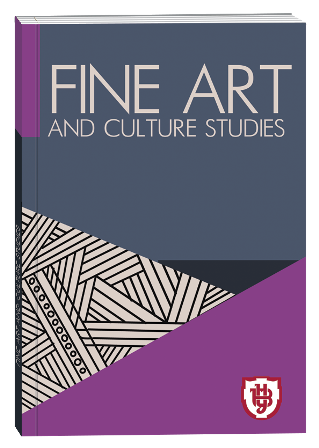RITUAL AS A MECHANISM FOR THE TRANSMISSION OF CULTURAL VALUES
DOI:
https://doi.org/10.32782/facs-2025-4-40Keywords:
archetype, culture, myth, symbol, ritual, ritual actionAbstract
Purpose. The article aims to examine ritual as a multilayered cultural phenomenon that combines symbolic activity, collective experience, and archetypal structures, as well as to reveal its role in the transmission and actualization of cultural values. Methodology. The study employs cultural and philosophical-symbolic approaches, drawing on the concepts of M. Eliade, E. Cassirer, S. Langer, and C. G. Jung. Methods of comparative cultural analysis and semiotic description are applied to uncover the polysemy of ritual and its functions within culture. Scientific novelty. Ritual is conceptualized as a multilayered symbolic form that integrates social, artistic, religious, and psychological dimensions. The study demonstrates the interrelation of Cassirer’s symbolic theory, Langer’s aesthetic philosophy, and Jung’s archetypal theory, which interpret ritual as a mediator between the individual and the collective, the rational and the irrational, in the transmission of cultural values.Conclusions. The analysis establishes that ritual represents one of the fundamental forms of cultural existence, ensuring the reproduction of values through symbolic actions and uniting different levels of cultural experience: the sacred (Eliade, 2001 ), the symbolic (Cassirer, 1955), the aesthetic (Langer, 1957), and the archetypal (Jung, 2017). Through ritual, cultural experience and collective meanings are transmitted, where symbolism not only represents but also actualizes the deep structures of cultural consciousness. Ritual performs a transformative function: it shapes cultural identity, links the present with the mythical past, and integrates the individual with the collective, the rational with the non-rational. Due to this multilayered nature, ritual appears not only as a social or religious act but also as a universal symbolic form that ensures cultural continuity and opens the possibility for both personal and communal transformation.
References
Васильков А. Визнання у філософії та математиці. Київ: Київське видавництво. Стан. Університет, 1972. 194 с.
Вебер М. Соціологія. Загальноісторичні аналізи. Політика / пер. О. Погорілий. Київ: Основи, 1998. 534 с.
Віктор І. В. Міф, традиція та ритуал у сучасному споживацьком суспільстві: філософсько-антропологічні характеристики. Гілея: науковий вісник: зб. наук. праць, гол. ред. В. М. Вашкевич. Київ: Гілея, 2018. Вип. 134(7). С. 254–257.
Волкова Г. Культурні цінності в їх спрямованості на містецтвознавство. Сучасний культурний простір у мистецтвознавчому дискурсі. Матеріали Міжнародної науково-практичної конференції. Київ: НАКККіМ, 2019. С. 9–11
Волкова Г. Ритуаловедення Еміля Дюркгейма у формуванні герменевтики культури. Мистецтвознавчі записки: зб. наук. праць. Київ: Міленіум, 2018. Вип. 3. С. 63–72.
Дюркгайм Е. Первісні форми релігійного життя: тотемна система в Австралії / пер. с фр. Г. Філіпчук, З. Борисюк; наук. ред. Т. Метельова. Київ: Юніверс, 2002. 424 с.
Еліаде М. Трактат з історії релігій / пер. Олексія Панича. Київ: Дух і Літера, 2016. 518 с.
Еліаде М. Священе і мирське. Міфи, сновидіння і містерії. Мефістофель і Андрогін / пер. Г. Кьоран, В. Сахно. Київ: Вид-во Соломії Павличко «Основи», 2001. 592 с.
Леві-Строс Кл. Структурна антропологія. Київ: Основи, 1997. 387 с.
Маркова О. Феномен спокутуваної жертовності в музиці і в музичній культурології. Україна на порозі третього тисячоліття: духовність і художньо-естетична культура: Аналітичні розробки, пропозиції наукових та практичних працівників. Науково-дослідний інститут «Проблеми людини» Міністерство культури та мистецтв України. Київ, 1999. Том 14. С. 529–534.
Ритуал URL: https://ru.wikipedia.org (дата звернення 28.02.2020)
Юнг К. Архетипи і колективне несвідоме. Львів: «Астролябія», 2017. с. 587.
Cassirer E. The myth of the state. New Haven and London: Yale University Press, Oxford University Press, 320 p. (1946)
Cassirer E. The Philosophy of Symbolic Forms. Vol. 1: Language. trans. Ralph Manheim. New Haven/London: Yale University Press, 328 p. (1955a)
Cassirer E. The Philosophy of Symbolic Forms. Vol. 2: Mythical Thought trans. Ralph Manheim. New Haven / London: Yale University Press, 285 р. (1955b)
Geertz C. Centers, Kings, and Charisma: Reflections on the Symbolics of Power. In: C. Geertz (Ed.), Local Knowledge: Further Essays in InterpretiveAnthropology (121–146). New York: Basic Books. (1983).
Langer S. K. Philosophy in a new key: a study in the symbolism of reason, rite, and art (first published in 1942). Mass: Harvard University Press. (1957).
Malinowski B. Magic, science and religion. Magic, science and religion and other essays. Glencoe, Illinois : The Free Press, 1948. Pp. 1–71.
Turner V. The Ritual Process: Structure and Anti-Structure. Piscataway, New Jersey: Transaction Publishers. (1995).
Van Gennep A. Le génie de l’organisation, la formule française et anglaise opposée à la formule allemande. Paris: Payot. (1915).








